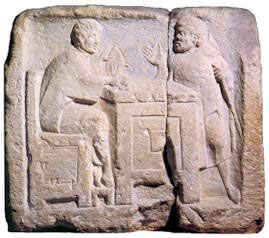|
The Roman Pee Tax
Entering the world around the first century AD, the Roman tax on urine apparently began with that fount of all depravity, the Emperor Nero of Rome. Not content with pissing off the Roman citizenry by spending their collected tax dollars on every sort of self-serving luxury imaginable, Nero decided to squeeze just a little bit more out of his countrymen—by imposing the pee tax. Now before you imagine coin operated valves pierced onto your personal parts, or morning chamber pots being weighed and measured by squeamish officials, it's important to note that this tax was in reality levied against urine used in the tanning industry. That's hide tanning, as in turning animal skins into leather. (Although some might say that's exactly what happens after years of basking under ultra violet rays.) Eventually the pee tax went out of favor and was discontinued. But alas, a bad idea does not stay dead. Nero's successor, Vespasianus (AD 69-79)found that Nero's wild spending (which included a sumptuous new palace in the heart of town) had left the royal coffers bare. This might be okay in an ordinary dictatorship, but this was Rome. The citizenry expected public works in exchange for their tax dollars. How was Vespasianus to keep things whirring along without any cash? Simple, create more taxes! A reinstatement of the pee tax was but one of Vespasianus' budget balancing strategies (another was the Fiscus Judaicus, the tax on Jews). Apparently Vespasianus' methods were not immune to snickers, even in his own day. The Roman historian Sueton records that teasing from his own son, Titus, caused the emperor to wave a coin under the young man's nose and declare the now famous phrase: "Pecunia non olet!" ("Money does not stink!"). Which of course distinguishes it from both urine and taxes.
|
 All of you who declare, "What'll they tax next? Air!" understand that as far as politicians go nothing is sacred (except perhaps their pensions). If it can be measured and assessed, it can be taxed. Add a crazed emperor into the picture and you understand how something like the Roman pee tax came into being.
All of you who declare, "What'll they tax next? Air!" understand that as far as politicians go nothing is sacred (except perhaps their pensions). If it can be measured and assessed, it can be taxed. Add a crazed emperor into the picture and you understand how something like the Roman pee tax came into being.